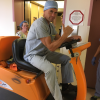As a radiologist at the BC Cancer Agency, Dr Charlotte Yong-Hing has been trying to get more women interested in pursuing a medical career in radiology.
Doctors of Innovation: “Preparing for surgery is like preparing for a race”
Over 100 participants from multidisciplinary teams were welcomed by Doctors of BC’s president-elect Dr Kathleen Ross at the launch of the new Surgical Patient Optimization Collaborative (SPOC) on M
Spotlight on a Specialist – Dr Kelly Mayson
Like many doctors, Dr Kelly Mayson had mentors as she pursued her medical degree in the mid-eighties. It was during a rural rotation that she met a GP anesthesiologist, who mentored her and ‘opened her eyes’ to the potential of anesthesiology.
A rockslide couldn't stop Dr Bell from helping his patients with their surgeries
Orthopedic waitlists in BC are long and any delays in providing hip and knee surgery can be quite devastating.
Working together to break down silos
Forty physicians and health care workers involved with two flagship initiatives of the Specialist Services Committee (SSC) – Facility Engagement (supporting MSAs) and Physician Quality Improvement
Dr Don Berwick’s Keynote Address at the PQI Summit
“We can absolutely succeed” is the message Dr Don Berwick brought to his inspirational keynote address last Monday, November 19 at the first-ever Physician Quality Improvement (PQI) Summit (link is external).
Dr Berwick, who is one of today’s top health care thinkers and President Emeritus and Senior Fellow at the Institute for Healthcare Improvement, also acknowledged the fact that “it is a tough time for health care around the world”.
Specialist Symposium: Shaping the Future of Specialist Care in BC
Over 200 attendees from all regions of BC with differing levels of involvement in BC’s specialist care came together in Vancouver last month to the inaugural Specialist Symposium: Shaping the Futur
Spotlight on a Specialist: Dr Marius Pienaar
What initially attracted Dr Marius Pienaar to move to British Columbia from Cape Town was his love of skiing and adventure. He had an immediate sense of connection with Prince Rupert after landing on New Year’s Eve in 1992 with his wife and three sons and 26 years later, he has a deep connection with the community he calls home. As the only OB/GYN in Prince Rupert serving the North Coast of BC, he is looking forward to spending the remaining years of his career, as well as his retirement, in “this amazing community.”
New SSC FEE Guide
As of January, 2019, a new SSC Fee Guide will be implemented for the specialist physicians.
Spotlight on a Specialist – Dr Tamara Shenkier
Dr Tamara Shenkier was the first person in her extended family to become a physician. Her father came to Canada as a refugee after World War II and settled in Montreal where he met her mother, a pre-school teacher. They were both were very supportive of Tamara’s ambitions and were very proud when she earned her medical degree at McGill University.
PQI Empowering Professionals and Systems
It was at a SSC Physician Quality Improvement training session where three health professionals: a nurse practitioner, a psychiatrist and a psychiatrist/pain fellow from Fraser Health, each with distinct backgrounds, passions and interests came together with one common goal: to decrease the waitlist for patients visiting the pain clinic. Currently, the Jim Pattison Outpatient Care and Surgery Centre’s Chronic Pain Clinic is the only multidisciplinary resource for pain management within Fraser Health.
Spotlight on a Specialist - Dr Julian Sernik
At the age of 20, Dr Julian Sernik decided to leave his hometown of Sydney, Australia for a year-long skiing holiday in Banff, Alberta, a town known for its winter sports and ski resorts. Little did he know that 18 years later he would be living in Cranbrook, BC along with his family of four, practicing medicine and working towards improving BC’s health system.
Recognition is the first step
As our seniors’ population grows, so does the prevalence of dementia. Dementia impairs cognitive function and can be the result of many diseases - the most common being Alzheimer’s Disease.
Recognizing early the symptoms, and providing appropriate and timely care is a crucial part of Drs Peter O'Connor and Leena Jain’s enhanced approach to dementia care – which launched in Fraser Health in 2015 with funding from the Specialist Services Committee (SSC) Quality & Innovation.
PQI Transforming Systems and Physicians
Quality improvement is key to working within any medical system, which is why SSC’s Physician Quality Improvement (PQI) initiative is spreading across all BC health authorities. In the past year, 509 physicians were trained through PQI and 144 QI projects were supported.
JCC Champions of Change Event
On February 21, 2018, the Joint Collaborative Committees (JCC) hosted the Champions of Change pre-forum day, in partnership with the BC Patient Safety and Quality Council (BCPSQC). This is the third year the JCCs have partnered with the Quality Forum – a partnership that has proved mutually beneficial to both parties by providing the opportunity to reach broader audiences, and attract greater participation of physicians. This year, close to 500 attendees shared their knowledge and commitment to expand on the successful work that has taken place throughout the province and beyond. See a summary of the event here.
BC Summit brings experts together for surgical improvements
The BC health care system has many valuable and sometimes competing priorities – so it’s always a good sign when one priority – in this case surgical improvement - gets the focused attention of many diverse health care providers.
The BC Summit on Surgical Improvement attracted over 200 specialists, GPs and surgical team members, operational leaders, policy makers and surgical quality improvement experts, as well as patient representatives.
Sometimes violence hinders help
Physicians and health care staff are dedicated to providing the best care possible to all people. Unfortunately, sometimes they face violence from the very people they are trying to help.
This is a challenging part of health care - particularly in mental health, substance use, medical and emergency settings – physicians and health care staff just trying to do their job without being hurt themselves.
Spotlight on a Specialist: Dr. Samuel Kohen
There’s often a ‘yin” and ‘yang’ to Dr. Samuel Kohen’s life: To pursue sports or academia, internal or emergency medicine, return to Ontario or move to the Comox Valley. Fortunately, Dr. Kohen’s decisions have allowed him to balance his passion for medicine while living a family oriented, outdoor lifestyle, by practicing Internal Medicine and Critical Care in the Comox Valley.
















